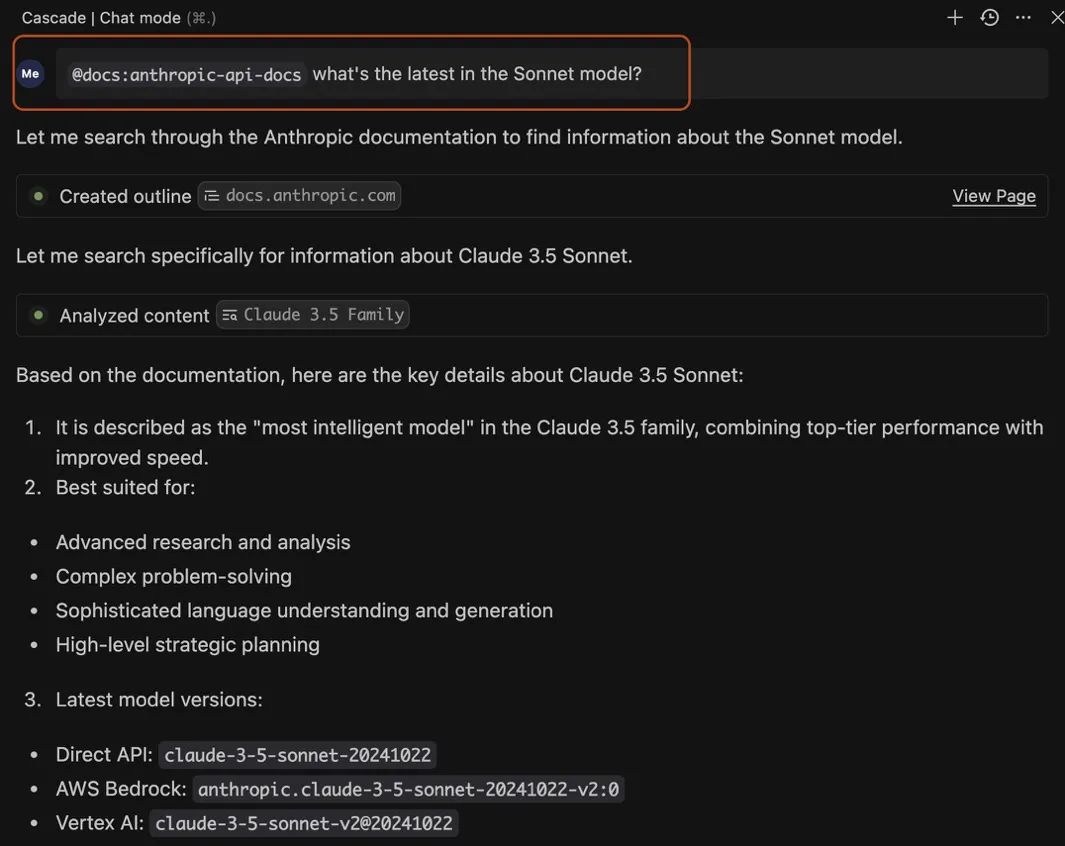WikiTok: When Wikipedia puts on the skin of "Shakeology" - a half-baked product with an empty idea, can it rely on AI to change its fate?
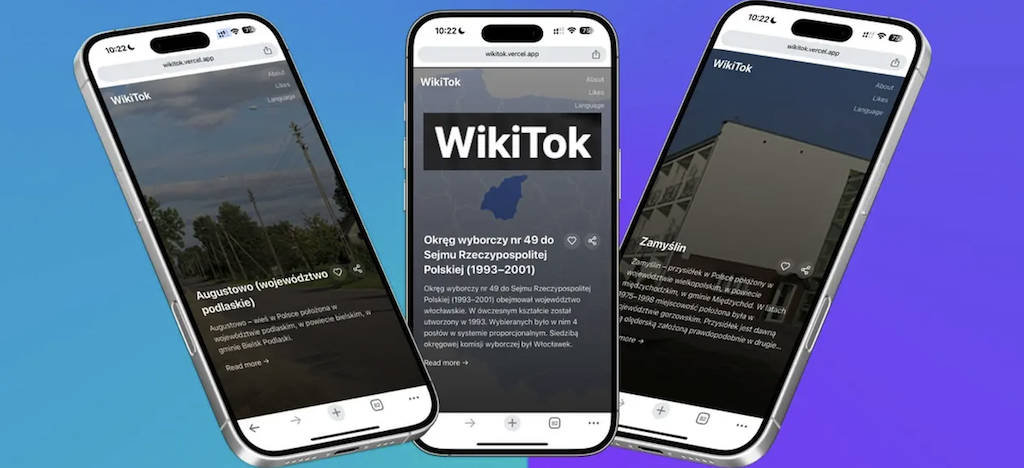
In this era of information explosion, short-video platforms are like a huge "time black hole", devouring a lot of people's fragmented time. In order to combat this digital addiction, various screen health management tools and digital minimalist lifestyles have emerged, but the results are often far from satisfactory. Recently, a program called WikiTok (website) The application of the "magic" is an alternative way of trying to "Magic" against "magic." -- to solve this problem: since you're addicted to infinitely brushing up on the next entry, let's let you "brush up" on the sea of knowledge.
This app was created by a creative foreign netizen with the help of AI technology, and its core concept is to transform serious Wikipedia content into an information flow form similar to Jitterbug short videos, so that the user can absorb the knowledge through infinite downward sliding. Therefore, this application is figuratively named "WikiTok." The

"Pseudo TikTok": Can WikiTok really be "Toked"?
WikiTok is essentially a very simple web application with a very plain design: a randomly pushed Wikipedia entry dominates the page, and the user simply swipes down the screen indefinitely to refresh and browse for new entries. The red heart ❤️ button at the top of the page is used to bookmark content of interest, and clicking on the "Read more" link takes the user to the official Wikipedia page for more detailed information. It is worth noting that WikiTok follows the principle of "randomized content pushing", and there is no algorithmic recommendation mechanism between entries.
The developers of WikiTok hope that users can discover some interesting information unexpectedly during this random browsing process, thus growing their insights subconsciously and transforming the fragmented time that would otherwise be used to brush up on short videos into a meaningful knowledge acquisition process. As the report on the ArsTechnica website commented, the charm of WikiTok lies in the fact that "you can never predict where the next jump will take you, and this sense of the unknown is full of surprises in itself."
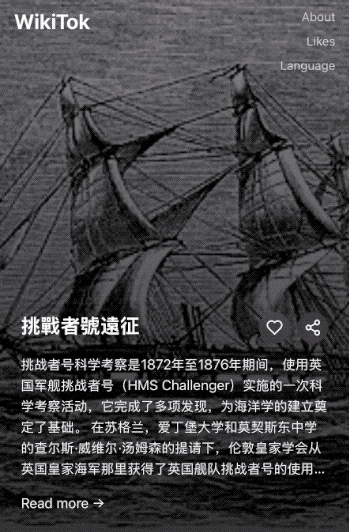
Gemal, the developer of WikiTok, seems to have a natural resistance to algorithmic recommendations. He has publicly stated that he will not add any kind of algorithm to WikiTok. According to him: "A lot of people have been calling for algorithms to be added to WikiTok, even leaving suggestions on GitHub. But I've always believed that our lives are already hostage to all sorts of ubiquitous and opaque algorithms, so why can't we keep a small piece of the world free for users to experience information browsing without any algorithmic intervention at all?"
While Gemal's intentions are idealistic, the actual user experience is not. In the actual experience, I had to mechanically swipe down the screen dozens of times before I could barely find a word that interested me a little bit. This completely randomized content delivery mechanism is tantamount to letting users in the Totaling over 64 million Wikipedia entries in the blind "Open Blind Box" The author originally hoped to roam freely in the sea of knowledge. The author originally hoped to swim freely in the sea of knowledge, but the result is that he found himself as if fishing for a needle in the sea, extremely inefficient, the experience is also slightly frustrating.
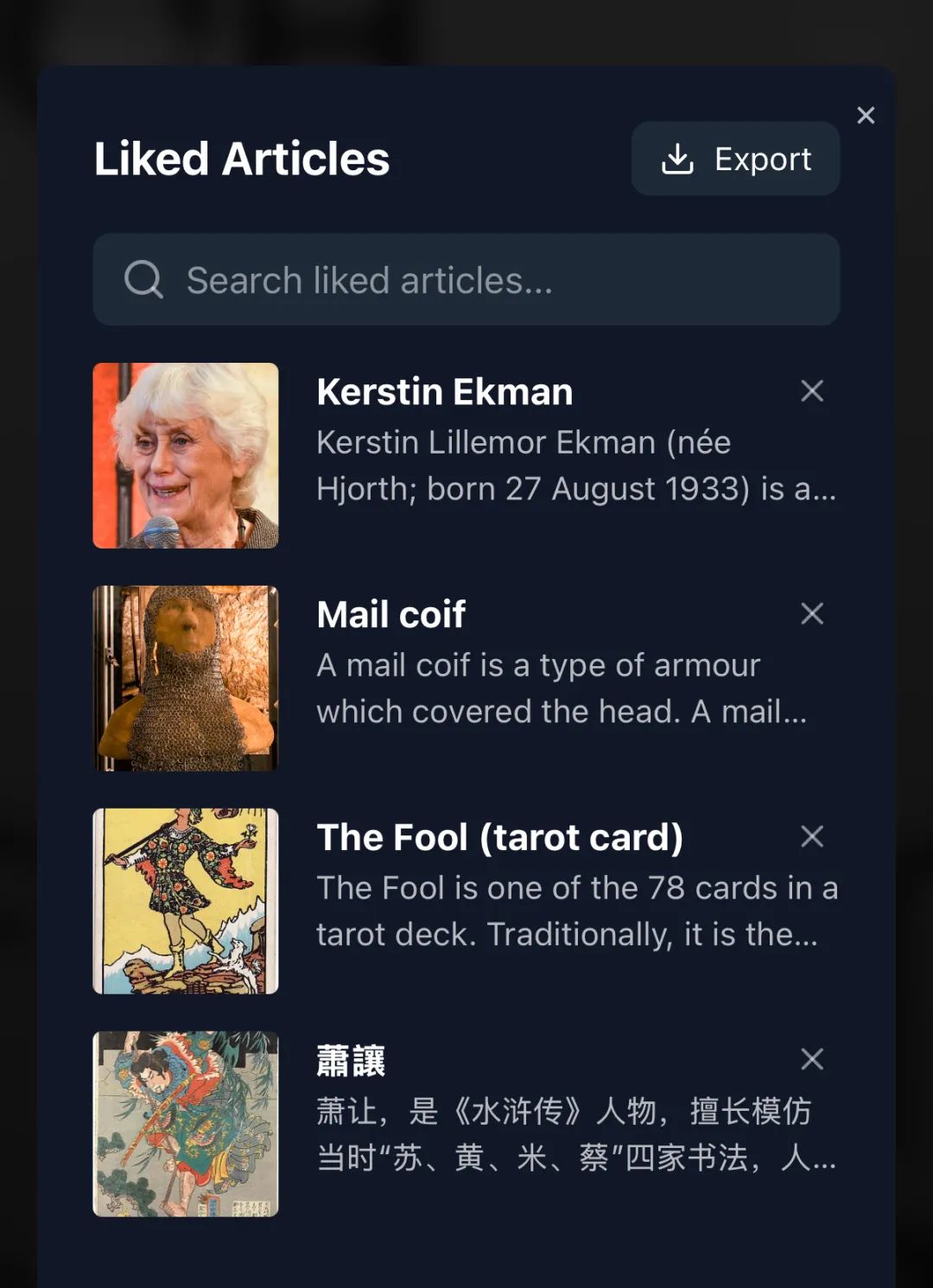
However, the ideal is plentiful, but the reality is very bone-skinny. In the actual experience, I swiped through nearly fifty entries on WikiTok before I stumbled upon one entry, and after that, there were no more entries related to the medieval theme. Even if I clicked on the red heart ❤️ to bookmark the entry, it was just saved in my favorites, waiting to be "blessed" in the future. As it stands, WikiTok is just a "TikTok" without the algorithmic recommendations that made TikTok a success. TikTok is a great success. TikTok's ability to keep users hooked is due in large part to its powerful algorithmic recommendation capability, which accurately captures users' interests and preferences and makes countless horizontal recommendations between related content, guiding users to explore deeper and deeper.
On the contrary, although the traditional Wikipedia is not supported by algorithmic recommendation, it has a powerful knowledge link network. When reading a Wikipedia entry, users can easily jump to other related entries by clicking on the links inside the entry, thus realizing countless extensions and extensions of knowledge. In fact, a high-quality Wikipedia entry itself is equivalent to a miniature "algorithmic recommendation system". Taking the "Middle Ages" Wikipedia entry as an example, the entry is not only detailed and informative, but also contains hundreds of internal links, as well as a large number of external references and recommended reading resources.
In short, TikTok's recommendation logic is "Single-article content association" , Wikipedia organizes its knowledge in a way that is "Fully rolled out and interconnected in a mesh." WikiTok, on the other hand, is somewhere in between: it tries to present Wikipedia's "comprehensive" knowledge in the form of TikTok's "single-article content", but artificially neuters the algorithmic recommendation mechanism for which TikTok is famous, resulting in a slightly "fragmented" product form and a greatly reduced user experience. The end result is a slightly "fragmented" product form, the user experience is also greatly reduced.
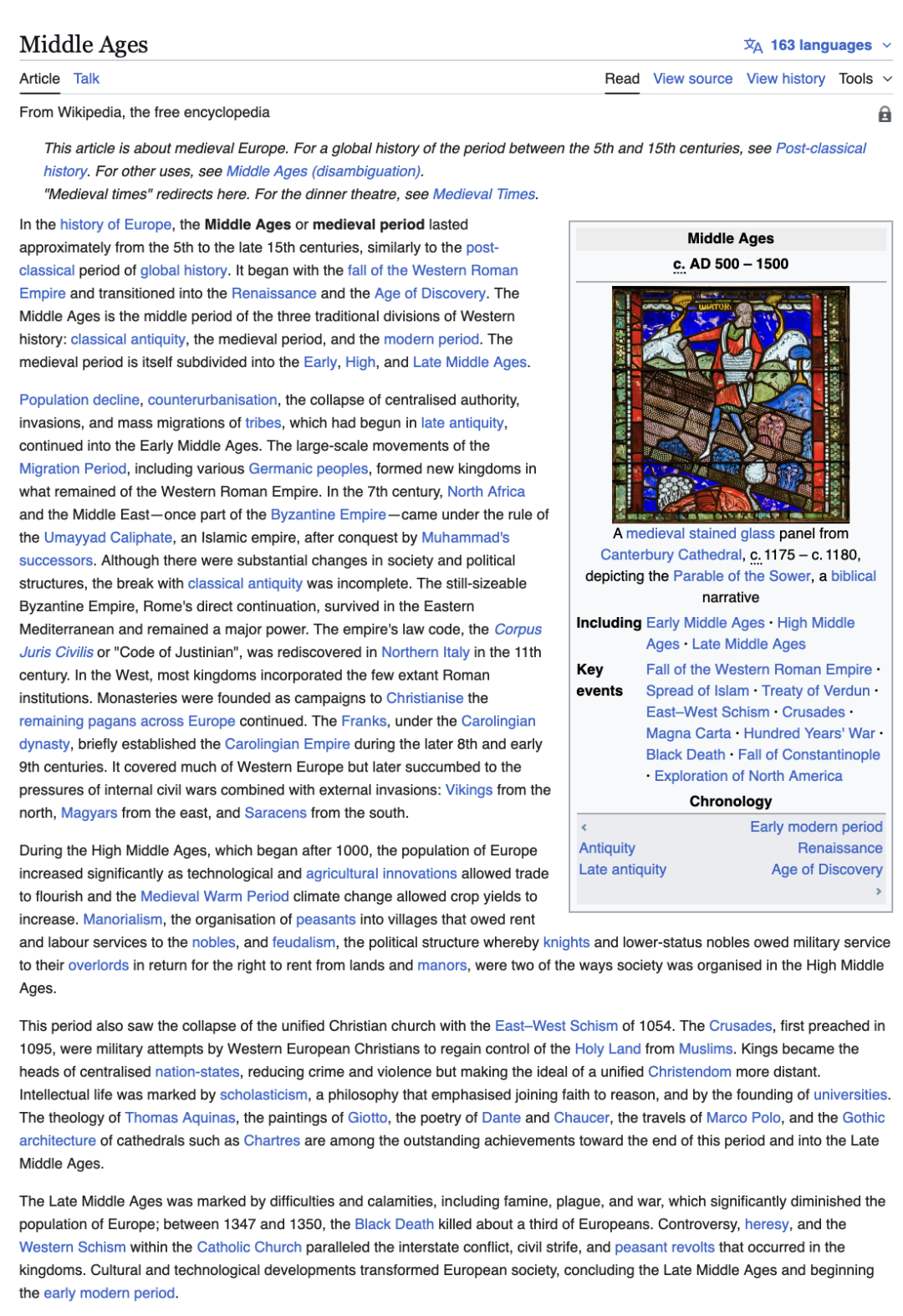
Of course, we can't be too hard on WikiTok - after all, it's only an hour and a half old, "super early" version, so it makes sense that there would be a lot of shortcomings in the features and experience. Considering that WikiTok is just a MVP (Minimally Viable Product) built quickly with AI technology , we should perhaps be more expectant and accommodating of its future development.
Can AI give WikiTok the power to "change the world"?
The idea for WikiTok was originally inspired by developer Tyler Angert's slightly "tongue-in-cheek" tweet on social media: "Here's a crazy idea: put the whole of Wikipedia on a single, infinitely scrollable page. " The tweet immediately sparked a large number of netizens to watch and discuss. One user commented: "Even better, make an infinitely scrollable Wikipedia page with personalized content recommendations based on your interests." Angert named the idea "WikiTok". The tweet was then retweeted countless times and, just a few hours later, was seen by developer Gemal.
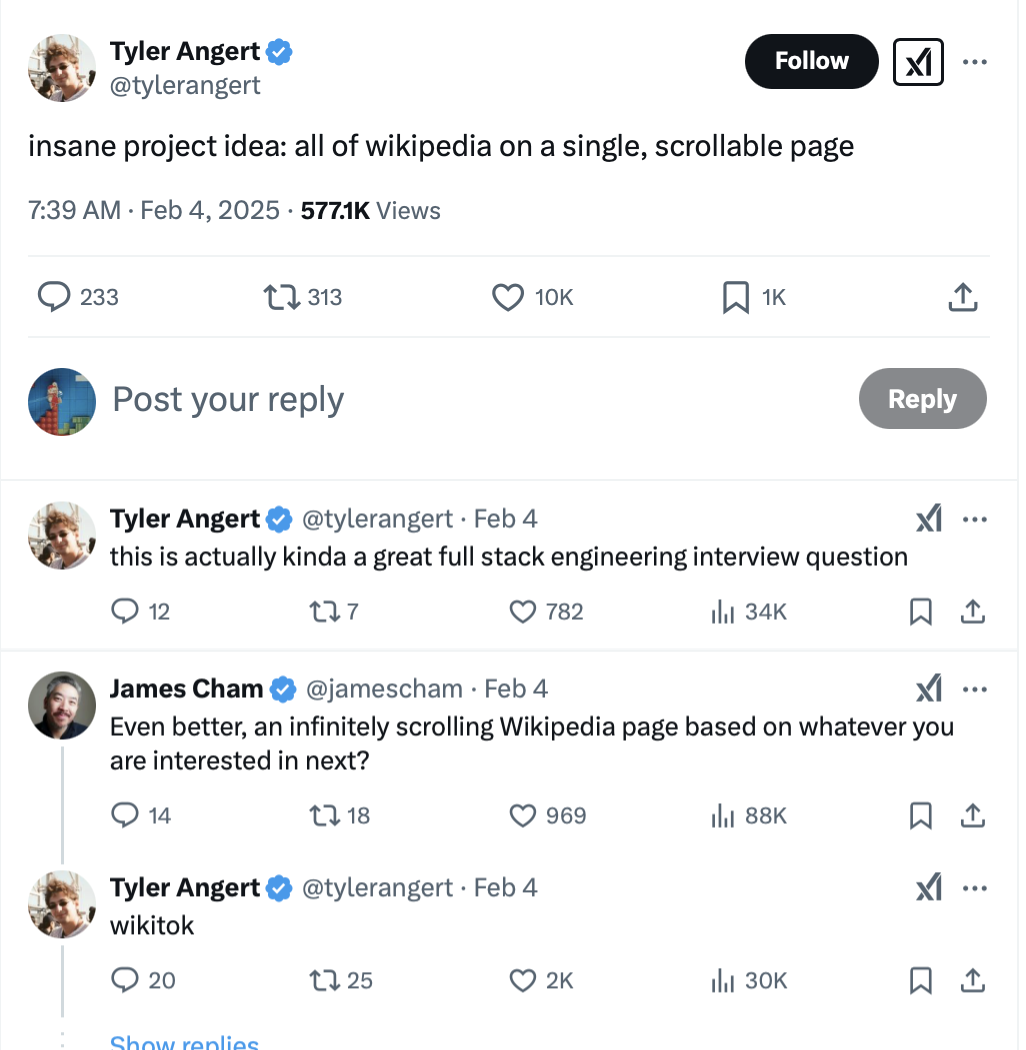
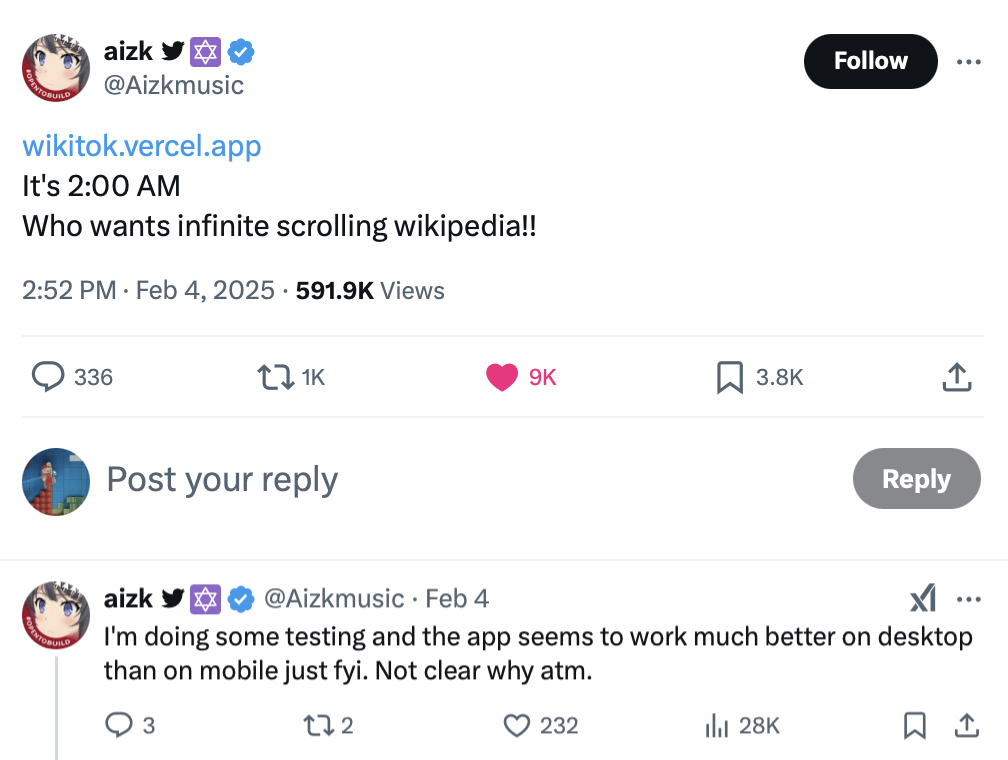
However, the lack of algorithms is not the only reason for WikiTok's mediocre experience. There is also a certain "roughness" in the presentation of the content. At present, the presentation of WikiTok's entries is very simple, with only a text summary accompanied by an enlarged image randomly extracted from the entry. The overall visual effect is a bit "crude", and it even gives people the illusion that they are traveling back to the ADSL dial-up era. The overall visual effect is a bit "simple" and even gives people an illusion of "traveling back to the ADSL dial-up era".
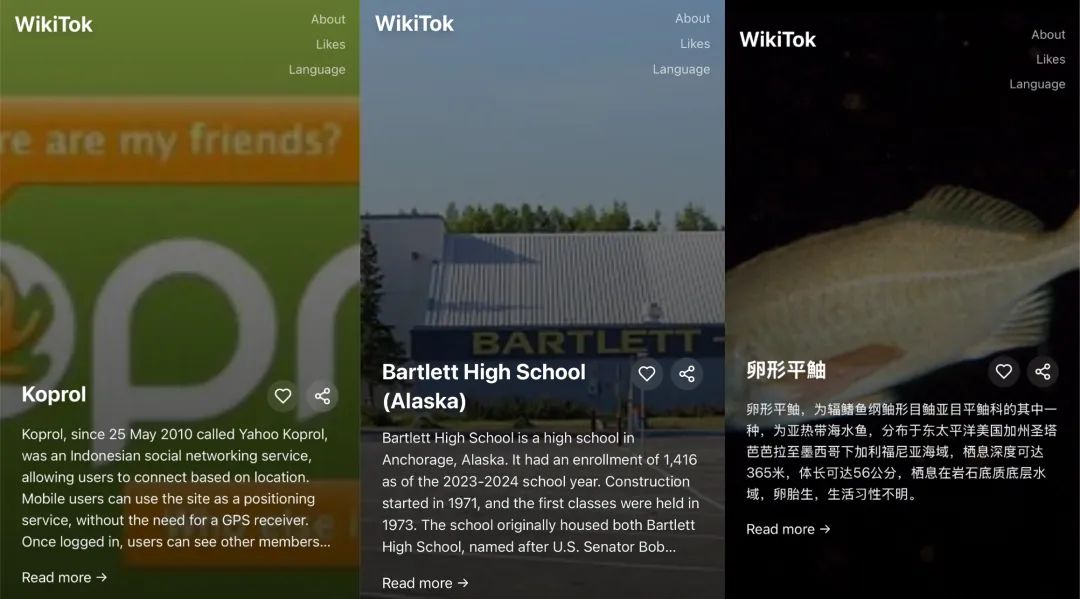
In terms of content presentation, AI can also bring great imagination to WikiTok. For example, WikiTok can be deeply integrated with AI video generation platforms such as Sora, Runway and Keling. Extracts text summaries from Wikipedia and automatically generates 15-second short videos of popularized knowledge, or more vivid dynamic graphic content, and can even add AI voice narration to further enhance the viewability and interest of the content. AI can also play a greater role in visualizing knowledge and information. AI can also play a greater role in visualizing knowledge and information, for example, by generating interactive 3D models, timeline animations, infographics, and other visualization tools to help users understand abstract knowledge concepts in a more intuitive and visual way.
If WikiTok can connect with personalized recommendation algorithms in the future and make full use of AI technology to improve the presentation of content, it may be able to truly transform into a phenomenal "knowledge version of TikTok", allowing users to be immersed in the sea of knowledge without realizing it in the process of infinite downward scrolling and unconsciously become Wikiholic (Wiki-addict). Wikiholic (Wiki addict). Further, algorithmic recommendations and AI-entry short videos can be provided to users as options, so that "fundamentalist" Wikipedia users can continue to enjoy the "sense of surprise" of random browsing, and at the same time open the door to immersive knowledge exploration for a wider public. The goal is to provide a broader public audience with the opportunity to explore knowledge in an immersive way.
Wikipedia itself is a huge treasure trove of knowledge on the Internet, containing a huge amount of information, a huge density of knowledge and unlimited fields of knowledge. Also utilizing fragmented time, if we can turn "after three hours of TikTok, I feel that my life is nothing" into "after three hours of WikiTok, I have even started a new field.", we can obtain more valuable information and reduce "information overload"! ", while acquiring more valuable information, it can also reduce the guilt brought by "information overload", why not?
Personally, I am looking forward to the emergence of a truly mature and useful WikiTok, which may be able to find a unique new path of knowledge dissemination between search engines, large-scale language models, algorithmic push and traditional encyclopedias, and truly realize the lofty vision of "Knowledge for All". It may be able to find a new path for knowledge dissemination between search engines, large-scale language models, algorithmic delivery and traditional encyclopedias that is unique and able to reach the public, truly realizing the lofty vision of "knowledge for all.
© Copyright notes
Article copyright AI Sharing Circle All, please do not reproduce without permission.
Related posts

No comments...


